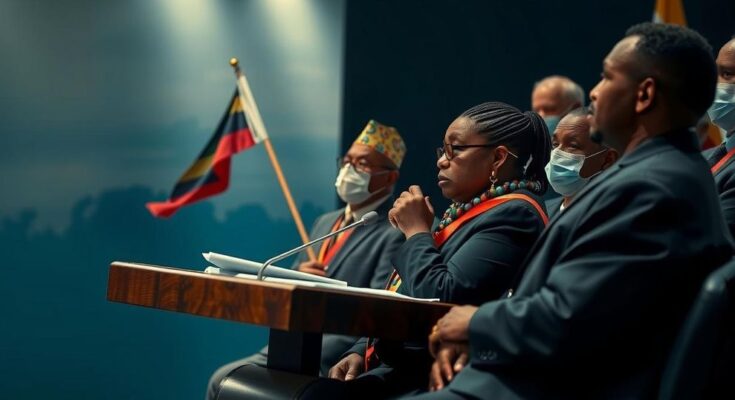On December 2, 2024, small island states urged the International Court of Justice to examine state obligations regarding climate change beyond existing treaties. Vanuatu’s emissaries highlighted violations of international law by high-emitting nations, stressing the existential threats posed by climate change. Throughout the hearings, various nations demanded that the court recognize broader legal responsibilities to mitigate climate impacts and ensure justice for vulnerable populations.
On December 2, 2024, countries grappling with severe climate change consequences urged the International Court of Justice (ICJ) in The Hague to go beyond existing climate treaties, such as the Paris Agreement, in its evaluation of the obligations of high-emitting United Nations member states. Ralph Regenvanu, a climate envoy from Vanuatu, opened the court’s proceedings by asserting that a select group of nations, responsible for the majority of global emissions, has violated international law. The case, initiated by the Pacific Islands Students Fighting Climate Change (PISFCC) and backed by Vanuatu’s government, seeks a comprehensive opinion from the ICJ regarding state obligations surrounding climate change that extends beyond established agreements including the UNFCCC and Kyoto Protocol.
During the hearings, Regenvanu emphasized the historical cultural ties of his people to their land and waters, which are now under threat. He asserted, “We find ourselves on the front lines of a crisis we did not create,” highlighting the dire implications of climate change for vulnerable nations. Vanuatu’s Attorney General, Arnold Kiel Loughman, called upon the ICJ to enforce international law, questioning how the actions leading humanity towards disaster could be deemed lawful.
Cynthia Houniuhi from PISFCC articulated the gravity of the situation, referring to climate change as eroding the fundamental intergenerational ‘sacred contract’. She reflected on the disconnection imposed by the loss of land and identity. Throughout the first day of hearings, representatives from several nations, including South Africa, Germany, and the Bahamas, underscored the need for the ICJ to recognize that existing climate agreements do not diminish other facets of international law.
Legal representatives illustrated the real-world impacts of climate change. Bahamas Attorney General Ryan Pinder starkly contrasted the destructive results of Hurricane Dorian with a photograph depicting lost homes, asserting, “You are looking at lost homes and lost livelihoods.” He insisted on immediate action from industrial nations, which have historically disregarded climate warnings, demanding reparations.
Saudi Arabia defended established climate treaties, warning against granting future generations legal standing. However, Pinder countered this by asserting that climate agreements inherently involve human rights and the obligation to prevent harm. He urged the ICJ to reject efforts to undermine established international law amidst the climate crisis.
The ICJ’s deliberations carry potential implications for international climate law, especially as they deliberate on the expectations for high-emitting states to account for their contributions to global warming and its profound effects on vulnerable communities.
The call for the ICJ’s opinion stems from the growing existential threats small island nations face due to climate change. These countries demand accountability from major greenhouse gas emitters, arguing that existing treaties are insufficient to safeguard their rights and futures. The proceedings underscore a significant moment in international law where vulnerable states seek justice through existing legal frameworks, challenging the status quo of climate agreements. The involvement of the ICJ may redefine state obligations, enhancing protection for future generations and vulnerable populations confronting the realities of climate impacts.
The proceedings at the ICJ signify a critical step for small island states as they seek to hold high-emitting nations accountable for their contributions to climate change. By requesting that the court considers obligations beyond existing treaties, these nations aim to reinforce international law’s applicability to the pressing issue of climate justice. The outcomes of these hearings may establish a precedent for how international law interacts with climate obligations and the rights of those most affected by environmental degradation.
Original Source: www.ipsnews.net




